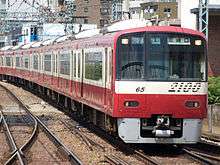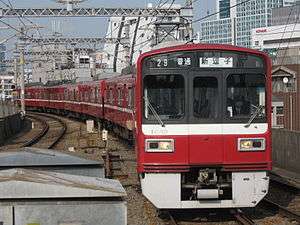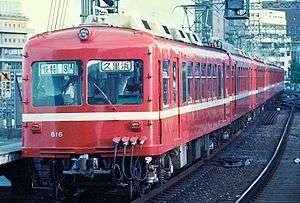Keikyu
 | |
|
Keikyu Corporation headquarters in Tokyo | |
Native name | 京浜急行電鉄株式会社 |
|---|---|
| Public | |
| Traded as | TYO: 9006 |
| Industry |
Public transport Real estate Retail |
| Headquarters | Minato, Tokyo, Japan |
Key people | Kazuyuki Harada, President & CEO |
| Subsidiaries |
Keihin Kyuko Bus etc |
| Website |
www |

Keikyu Corporation (京浜急行電鉄株式会社 Keihin Kyūkō Dentetsu Kabushiki-gaisha) (TYO: 9006), also known as Keihin Kyūkō (京浜急行) or, more recently, Keikyū (京急), is a private railroad that connects inner Tokyo to Kawasaki, Yokohama, Yokosuka and other points on the Miura Peninsula in Kanagawa Prefecture. It also provides rail access to Haneda Airport in Tokyo. Keihin (京浜) means the Tokyo (東京) - Yokohama (横浜) area. The company's railway origins date back to 1898, but the current company dates to 1948. The Kantō region's first electric train (the nation's third, after Kyoto Electric Railway and Nagoya Electric Railway) rolled in January 1899.[1]
It is part of the Fuyo Group and has its headquarters in Minato, Tokyo. The company changed its English name from Keihin Electric Express Railway Co., Ltd. to Keikyu Corporation on 21 October 2010.[2]
Trains on the Main Line have a maximum operating speed of 120 kilometres per hour (75 mph), making it the third fastest private railroad in the Tokyo region, after the Keisei Skyliner and the Tsukuba Express. The track gauge is 1,435 mm (4 ft 8 1⁄2 in) (Standard gauge), differing from the more common Japanese track gauge of 1,067 mm (3 ft 6 in).
Lines
| Lines | Sections | Length (km) |
Number of stations | ||
|---|---|---|---|---|---|
| Main Line | Sengakuji Station | – | Uraga Station | 56.7 | 50 |
| Kurihama Line | Horinouchi Station | – | Misakiguchi Station | 13.4 | 9 |
| Zushi Line | Kanazawa-Hakkei Station | – | Shin-Zushi Station | 5.9 | 4 |
| Daishi Line | Keikyū Kawasaki Station | – | Kojimashinden Station | 4.5 | 7 |
| Airport Line | Keikyū Kamata Station | – | Haneda Airport Domestic Terminal Station | 6.5 | 7 |
| Total | 5 lines | 87.0 | 73 | ||
The Keikyu Main Line runs between south area of Tokyo, Kawasaki, Yokohama, and Yokosuka. Shinagawa Station is the terminal station in Tokyo of this line. Its Kaitoku (快特) limited-stop service competes with JR East's Tōkaidō Main Line and Yokosuka Line.
From Sengakuji station, Keikyu trains run into the Toei Asakusa Line and Keisei Electric Railway (to Narita Airport) and Hokuso Railway (to Chiba newtown area) lines.
Stations
There are a total of 73 “unique” stations (i.e., counting stations served by multiple lines only once) on the Keikyu network, or 77 total stations if each station on each line counts as one station.[3]
Rolling stock
Active
- 600 series (introduced 1994)
- 800 series (introduced 1978)
- N1000 series (introduced 2002)
- 1500 series (introduced 1985)
- 2000 series (introduced 1982)
- 2100 series (introduced 1998)
 600 series
600 series 800 series
800 series- N1000 series
 1500 series
1500 series 2000 series
2000 series
Retired
- 230 series (introduced 1930)
- 400 series (introduced 1965)
- 500 series (introduced 1951)
- 700 series (1956 - 1986, reclassified 600 series from 1966)[4]
- 700 series (introduced 1967)
- 800 series (introduced 1958, reclassified 1000 series)
- 1000 series (1959 - 2010)
- 230 series
- 400 series
- 500 series
 600 series
600 series 700 series
700 series
Accidents
Since 1997, Keikyu has had four accidents, all of which were on the main line, in the vicinity of Yokosuka.
On 7 April 1997, at about 2:47 pm, the first three cars of a four-car train derailed after colliding with a mudslide, resulting in 22 people injured. The accident occurred between Taura and Anjinzuka stations, with approximately 60 people on board. Heavy rains caused the mudslide, 7 months after a report by the train company to the Transportation Minister that there was little probability of such an occurrence in that area. 500 workers were mobilized as the train service was temporarily suspended between Kanazawa-Hakkei and Horinouchi Stations.[5]
On 24 November 2000, at about 5:20 am, the front car of a four-car train derailed after a truck collided with the first car of the train at a railroad crossing, resulting in 3 passengers being slightly injured. The accident occurred in Yokosuka and the approximately 100 commuters on board later walked about 200 m to the nearest station to continue their commute via bus. The driver of the truck reported his foot became stuck between the accelerator and brake pedals, sending him through the crossing bar and into the crossing. Normal operations continued about 4 hours later that morning.[6]
On 24 September 2012, at about 11:58 pm, the first three cars of an eight-car train derailed after colliding with a mudslide, resulting in injuries to 28 people including the train conductor. 7 men and women were seriously injured, including fractures, broken ribs and pelvises. The accident occurred between Oppama and Keikyu Taura stations, between Yokohama and Yokosuka, with approximately 700 passengers on board. Heavy rains caused the mudslide, sweeping away safety nets that had been installed in 1998, the year after a similar mudslide in the area.[7] An area of soil about 12 meters high and 15 meters wide fell onto the tracks, bringing trees and fencing structures with it. The train was travelling 75 km/h before the conductor applied the brakes, 30 to 40 meters before the mudslide.[8] Train services were temporarily suspended between Kanazawa-Hakkei and Hemi stations and temporary bus services were provided by the train company until normal operations resumed approximately 55 and a half hours later after the assessment and clean-up process.[9]
On 18 April 2013, at about 4:30 pm, two window panes shattered in the front car of a local commuter train while passing an express train going the opposite direction, resulting in minor lacerations to two high school students sitting with their backs to the windows. One window pane was also cracked on the passing train with no injuries. The accident occurred between Taura and Anjinzuka stations, with approximately 30 people in that car at the time of the accident.[10]
References
- ↑ Yoshikawa, Fumio (1989). Nippon Densha Hattatsu-shi [The History of Development of Electric Trains in Japan]. Color Books No.778 (in Japanese). Osaka: Hoikusha. p. 99.
- ↑ 京急、英文会社名を「KEIKYU」に=21日から変更、ブランド浸透で (in Japanese). Jiji Press. October 19, 2010. Retrieved October 23, 2010.
- ↑ 民鉄各社紹介 京浜急行電鉄株式会社 (in Japanese). 日本民営鉄道協会. Retrieved 2012-06-07.
- ↑ Saiki, Minoru (July 2014). 高性能車草分けの特急車 京浜急行電鉄600形 [Pioneering limited express trains: Keikyu 600 series]. Tetsudō Daiya Jōhō Magazine (in Japanese). Vol. 43 no. 363. Japan: Kōtsū Shimbun. pp. 77–79.
- ↑ "22 injured as mudslide derails train" The Daily Yomiuri (April 8, 1997).
- ↑ "Kanagawa truck-train collision hurts 3" The Daily Yomiuri (November 25, 2000).
- ↑ Aoki, M. (September 27, 2012). "Keikyu ups injury total from derailment to 28". The Japan Times
- ↑ "11 injured in train derailed by landslide". (September 26, 2012). The Daily Yomiuri
- ↑ Keikyu line resumes operations; company to reconsider sections subject to driving restrictions. (September 28, 2012). The Daily Yomiuri
- ↑ Carriage windows shatter as keikyu trains pass. (April 19, 2013). Japan Today. Retrieved from http://www.japantoday.com/category/national/view/carriage-windows-smash-as-keikyu-trains-pass
Further reading
- Hirooka, Tomoki (22 July 2015). THE 京急電鉄 [Keikyu Corporation] (in Japanese). Japan: Sairyusha. ISBN 978-4779123658.
- Yajima, Shuichi (8 July 2015). 京急電鉄各駅停車 [All Stations of Keikyu Corporation] (in Japanese). Japan: Yosensha Co., Ltd. ISBN 978-4800306845.
External links
| Wikimedia Commons has media related to Keikyu Corporation. |
- Official website (in Japanese)
- Keikyu website
